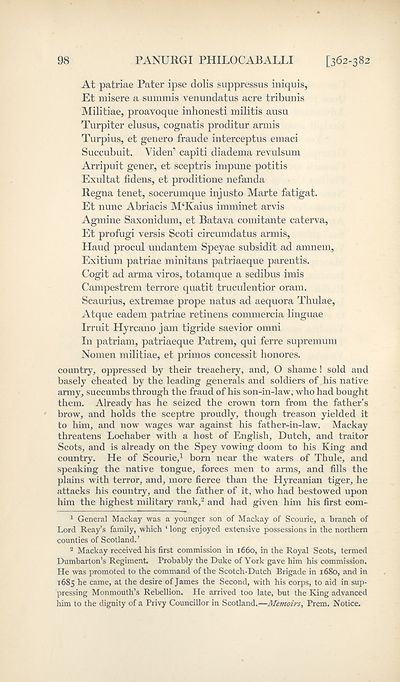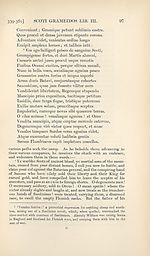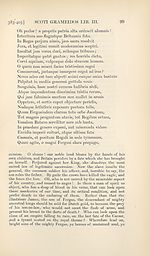Series 1 > Grameid: an heroic poem descriptive of the campaign of Viscount Dundee in 1689, and other pieces
(169) Page 98
Download files
Complete book:
Individual page:
Thumbnail gallery: Grid view | List view

98
PANURGI PHILOCABALLI [362-382
At patriae Pater ipse dolis suppressus iniquis,
Et misere a summis venundatus acre tribunis
Militiae, proavoque inhonesti militis ausu
Turpiter elusus, cognatis proditur armis
Turpius, et genero fraude interceptus emaci
Succubuit. Yiden1 capiti diadema revulsum
Arripuit gener, et sceptris impune potitis
Exultat fidens, et proditione nefanda
Regna tenet, socerumque injusto Marte fatigat.
Et nunc Abriacis M‘Kaius imminet arvis
Agmine Saxonidum, et Batava comitante caterva,
Et profugi versis Scoti circumdatus armis,
Hand procul undantem Speyae subsidit ad amnem,
Exitium patriae minitans patriaeque parentis.
Cogit ad arma viros, totamque a sedibus imis
Campestrem terrore quatit truculentior oram.
Scaurius, extremae prope natus ad aequora Thulae,
Atque eadem patriae retinens commercia linguae
Irruit Hyrcano jam tigride saevior omni
In patriam, patriaeque Patrem, qui ferre supremum
Nomen militiae, et primos concessit honores.
country, oppressed by their treachery, and, O shame! sold and
basely cheated by the leading generals and soldiers of his native
army, succumbs through the fraud of his son-in-law, who had bought
them. Already has he seized the crown tom from the father’s
brow, and holds the sceptre proudly, though treason yielded it
to him, and now wages war against his father-in-law. Mackay
threatens Lochaber with a host of English, Dutch, and traitor
Scots, and is already on the Spey vowing doom to his King and
country. He of Scourie,1 born near the waters of Thule, and
speaking the native tongue, forces men to arms, and fills the
plains with terror, and, more fierce than the Hyrcanian tiger, he
attacks his country, and the father of it, who had bestowed upon
him the highest military rank,2 and had given him his first com-
1 General Mackay was a younger son of Mackay of Scourie, a branch of
Lord Reay’s family, which ‘ long enjoyed extensive possessions in the northern
counties of Scotland.’
2 Mackay received his first commission in 1660, in the Royal Scots, termed
Dumbarton’s Regiment. Probably the Duke of York gave him his commission.
He was promoted to the command of the Scotch-Dutch Brigade in 1680, and in
1685 he came, at the desire of James the Second, with his corps, to aid in sup¬
pressing Monmouth’s Rebellion. He arrived too late, but the King advanced
him to the dignity of a Privy Councillor in Scotland.—Memoirs, Prem. Notice.
PANURGI PHILOCABALLI [362-382
At patriae Pater ipse dolis suppressus iniquis,
Et misere a summis venundatus acre tribunis
Militiae, proavoque inhonesti militis ausu
Turpiter elusus, cognatis proditur armis
Turpius, et genero fraude interceptus emaci
Succubuit. Yiden1 capiti diadema revulsum
Arripuit gener, et sceptris impune potitis
Exultat fidens, et proditione nefanda
Regna tenet, socerumque injusto Marte fatigat.
Et nunc Abriacis M‘Kaius imminet arvis
Agmine Saxonidum, et Batava comitante caterva,
Et profugi versis Scoti circumdatus armis,
Hand procul undantem Speyae subsidit ad amnem,
Exitium patriae minitans patriaeque parentis.
Cogit ad arma viros, totamque a sedibus imis
Campestrem terrore quatit truculentior oram.
Scaurius, extremae prope natus ad aequora Thulae,
Atque eadem patriae retinens commercia linguae
Irruit Hyrcano jam tigride saevior omni
In patriam, patriaeque Patrem, qui ferre supremum
Nomen militiae, et primos concessit honores.
country, oppressed by their treachery, and, O shame! sold and
basely cheated by the leading generals and soldiers of his native
army, succumbs through the fraud of his son-in-law, who had bought
them. Already has he seized the crown tom from the father’s
brow, and holds the sceptre proudly, though treason yielded it
to him, and now wages war against his father-in-law. Mackay
threatens Lochaber with a host of English, Dutch, and traitor
Scots, and is already on the Spey vowing doom to his King and
country. He of Scourie,1 born near the waters of Thule, and
speaking the native tongue, forces men to arms, and fills the
plains with terror, and, more fierce than the Hyrcanian tiger, he
attacks his country, and the father of it, who had bestowed upon
him the highest military rank,2 and had given him his first com-
1 General Mackay was a younger son of Mackay of Scourie, a branch of
Lord Reay’s family, which ‘ long enjoyed extensive possessions in the northern
counties of Scotland.’
2 Mackay received his first commission in 1660, in the Royal Scots, termed
Dumbarton’s Regiment. Probably the Duke of York gave him his commission.
He was promoted to the command of the Scotch-Dutch Brigade in 1680, and in
1685 he came, at the desire of James the Second, with his corps, to aid in sup¬
pressing Monmouth’s Rebellion. He arrived too late, but the King advanced
him to the dignity of a Privy Councillor in Scotland.—Memoirs, Prem. Notice.
Set display mode to:
![]() Universal Viewer |
Universal Viewer | ![]() Mirador |
Large image | Transcription
Mirador |
Large image | Transcription
Images and transcriptions on this page, including medium image downloads, may be used under the Creative Commons Attribution 4.0 International Licence unless otherwise stated. ![]()
| Scottish History Society volumes > Series 1 > Grameid: an heroic poem descriptive of the campaign of Viscount Dundee in 1689, and other pieces > (169) Page 98 |
|---|
| Permanent URL | https://digital.nls.uk/126597585 |
|---|
| Attribution and copyright: |
|
|---|
| Description | Over 180 volumes, published by the Scottish History Society, containing original sources on Scotland's history and people. With a wide range of subjects, the books collectively cover all periods from the 12th to 20th centuries, and reflect changing trends in Scottish history. Sources are accompanied by scholarly interpretation, references and bibliographies. Volumes are usually published annually, and more digitised volumes will be added as they become available. |
|---|


